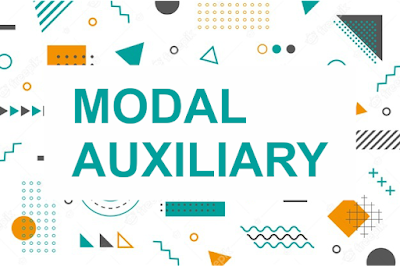Modal Auxiliary Verbs
Modal auxiliary verbs adalah kata kerja bantu/tambahan yang digunakan untuk mengekspresikan
kemungkinan, keinginan, hingga kebutuhan untuk melakukan suatu pekerjaan (verb).
Pattern:
|
Subject |
+ |
Modal Auxiliary |
+ |
Verb-1 (Base Form) |
Can
Can (bisa/dapat) adalah modal auxiliary yang digunakan untuk menunjukkan kemampuan melakukan
sesuatu (ability).
Example:
1.
I
can’t/cannot help you to repair this
computer.
2.
Can you fix this computer in an hour?
Could
Could (bisa/dapat) mirip dengan can tapi could dalam penggunaannya lebih terkesan formal dan sopan.Juga dapat digunakan untuk polite request, past ability, dan imaginary situation.
Example:
1.
It’s
getting cold here, could you turn
off the air conditioner?
2.
I
couldn’t/could not do that again for
you, sorry, I’m on a hectic time now.
May
May (boleh/mungkin) digunakan untuk mengekspresikan kemungkinan (possibility),
meminta/memberi izin, serta memohon sesuatu.
Example:
1.
You
may not go out when there’s a
blizzard, it’s dangerous.
2.
May I go to the bathroom now, Madam?
Might
Might (boleh/mungkin) hampir sama seperti may, yaitu untuk menunjukkan kemungkinan. Akan tetapi might tidak bisa digunakan untuk meminta/memberi izin, atau memohon doa.
Example:
1.
They
might tell you the truth, but they don’t
love you as we did, please mind it!
2.
It
might be easier if you unwrap it
from this side.
Will
Will (akan) digunakan untuk menjelaskan sesuatu
yang akan dilakukan di masa depan, maksud/intention, willingness, promise dan prediction.
Example:
1.
We
will always together, we can’t be
separated until God decides us to!
2.
He
will not/won’t betray our trust
anymore, please give him another chance.
Would
Sama
seperti hubungan can dan could, will dan would juga
memiliki arti dan kegunaan yang sama. Perbedaan keduanya terletak pada tingkat
formalitasnya. Berfungsi untuk (polite permission)
Example:
1.
You
would feel better if you drink
chocolate.
2.
Would you tell me the truth, all the truth
that has been hidden all this time?
Shall
Shall adalah kosakata alternative dari “will”, yang dulunya sering digunakan oleh British. Shall hanya untuk I dan We.
Example:
1.
Shall
we tell him to leave now?
2. I shall be enrolled in Cambridge this year.
Should
Should (sebaiknya/seharusnya) sebenarnya adalah bentuk past dari shall,
akan tetapi dalam penerapannya sedikit berbeda.
Example:
1.
I
should’ve done my homework earlier.
2.
Reza
looks so pale, I think he should go
to the hospital right now.
Must
Must (harus) adalah modal auxiliary yang digunakan untuk menyatakan keharusan, larangan (prohibition), menunjukkan keyakinan akan suatu pendapat.
Example:
1.
You must understand this, Erica, there’s
no way I would betray our love!
2.
I
must not tell lies to my parents, I
don’t want to make a sin.
Need
Need (butuh/perlu) untuk
mengekspresikan kewajiban dan kebutuhan (obligation, necessity) .
Contoh
1.
No
one need know anything about you.
2.
My
father needn’t have called, I told
him I would be late.
Retrieved from https://kampunginggrispare.info/modal-auxiliary/
EXERCISE 1
Retrieved
from https://kampunginggrispare.info/modal-auxiliary/



